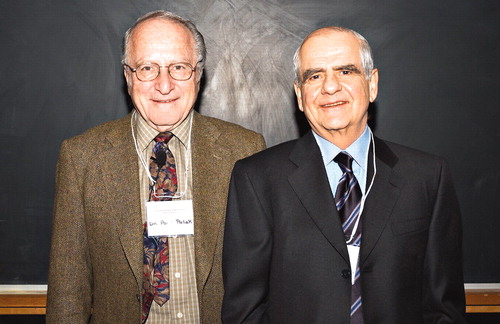Canadian Psychiatrists Explore Issues Near and Far
The Ontario District Branch (ODB) took a multifaceted approach to the topic of violence and society at a daylong meeting in Toronto last month.
Gerald Schneiderman, M.D., chair of ODB's Program Committee, said,“ There is growing awareness of increased violence in Canada and the global community.” He brought experts from Canada and the United States to discuss various aspects of this much-debated social problem.
Paul Polak, M.D., opened the day by recounting his journey from Czechoslovakia to Canada in 1939. His father had foreseen the dangers of the Nazi regime and saved his family from likely death in the Holocaust by relocating.
Polak helped his father as he started from scratch to build a new life for his family. “From that experience, I learned that I could always land on my feet.”

He brought that entrepreneurial attitude to the problem of poverty, which he sees as a direct cause of violence.
Polak practiced psychiatry as a young man and saw links between mental illness and the impoverished conditions in which his patients lived.
Through skillful investments in oil and real estate, he became financially able to launch a career in which he could bring his entrepreneurial energy and attitude to developing solutions to poverty throughout the world.
Today, Polak heads International Development Enterprises (IDE), a multimillion-dollar effort based in Lakewood, Colo., that operates in 15 countries and Central America.
IDE's mission is to empower the rural poor to escape poverty, and its approach is “to treat poverty alleviation as a business.”
Polak began in Bangladesh in 1981 using strategies that he had employed as a psychiatrist to try to understand the causes of serious mental illness and how to alleviate it.
He went directly to rural farmers and questioned them about their views on the causes of their poverty.
Rural farmers are the primary clientele because, Polak estimated, three-quarters of the 1.1 billion people living in extreme poverty work as small-scale farmers.
Polak said, “IDE regards the rural poor as potential customers, producers, and entrepreneurs.”
The approaches he came up with are simple, logical, and successful. He believes that to compete effectively, rural farmers should maximize their advantage by selecting labor-intensive crops. Lack of water was a critical problem identified by those farmers. They frequently irrigated their fields by carrying buckets of water, which was an inefficient and exhausting use of labor.
Bangladesh also suffered from uneven rain patterns, with torrential rains during the monsoon seasons and little water during the rest of the year.
To respond to those needs, Polak worked with others to develop a foot-operated treadle pump. A user pedals up and down on two long bamboo poles that activate two steel cylinders. Suction pulls groundwater into the cylinders from which it is dispersed to a channel in the field.
IDE sells the pumps through local distributors for less than $100. Polak said that approximately 1.5 million of them have been sold, and they have increased productivity of more than 600,000 acres of farmland in Bangladesh.
Polak's work has been featured in such publications as National Geographic and Scientific American.
Terrorists Not Irrational
Jerrold Post, M.D., took a different tack to the problem of violence.
In a talk titled “When Hatred Is Bred in the Bone,” he explored the mind of a terrorist. “Policies designed to deter terrorists from their acts of terrorism should be based on an understanding of what makes terrorists tick,” he said.
Post is a professor of psychiatry, political psychology, and international affairs and director of the Political Psychology Program at George Washington University in Washington, D.C.
He began by telling the audience that terrorists typically do not conform to the stereotype of crazed fanatics. Emotionally disturbed individuals likely would be excluded because they represent security risks to the group.
Instead, he said, research has shown that normality is the most common outstanding characteristic of terrorists. Social psychology, rather than individual psychopathology, therefore, becomes the best means of analyzing terrorist behavior.
Post identified four terrorist types: nationalist-separatist, social revolutionary, right wing, and religious fundamentalists that show differences from each other, although they all employ terrorist tactics.
He distinguished between the first two groups in terms of generational dynamics. Social-revolutionary terrorists, exemplified by the Red Brigades in Italy, are disloyal to the generation of their families that is loyal to the regime. National-separatist terrorists, such as al-Fatah and the Irish Republican Army, are loyal to the generation of their parents whom they believe were damaged by the regime in power.
Religious fundamentalists, such as Islamic, Jewish, Christian, and Sikh radical extremists, are becoming increasingly important and are particularly dangerous because they seek revenge upon the Western world and are not constrained by Western reaction. The role of the leader, as exemplified by Osama bin Laden, in these groups is crucial.
Post described his experience interviewing an Islamic fundamentalist terrorist who was a defendant in the al Qaeda bombing of the U.S. embassy in Tanzania.
He noted that typically unquestioning obedience to authority and Allah are instilled at any early age for those who become terrorists.
Fusion with the group is important in all the religious fundamentalist organizations.
Terrorism Called Psychological Warfare
Post said that recommendations for deterring terrorism grow out of an analysis of what motivates terrorist groups. Terrorism, which is a form of psychological warfare, is more effectively countered with psychological warfare than with “smart bombs.”
He listed four methods:
Inhibit potential terrorists from joining the group. Alienated youth must be able to envision a future within the system that promises redress of long-standing economic and social inequity. | |||||
Produce dissension within the group. | |||||
Facilitate exit from the group. Amnesty programs have been effective in some situations. | |||||
Reduce support for the group. Marginalizing al Qaeda as an aberrant extremist group that is counter to mainstream Islam could work if supported by moderate Muslim clerics. | |||||
Information about International Development Enterprises is posted at<www.ide-international.org/index2.jsp>.▪



